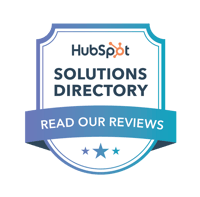It's a devastating feeling when no one shows up to your party. Hosting a webinar with 0 attendees can feel the same way.
If you're seeing a disappointing lack of attendance for your webinars, don't give up just yet - there are a few common webinar mistakes that can drive down attendees. The good news is, they're also very fixable.
1. You're Not Making it Easy to Sign Up
First and foremost, making the registration process simple and quick is an absolute must. If you want the most conversions, your best bet is to create a separate registration page for your webinar, that includes the following:
- A form right on the page, with as few fields as possible
- Date, time and time zone are easy to see when scanning
- Speaker information - not just a generic bio, but why they're experts on the topic at hand
- What the webinar is about
- What platform the webinar will be held on
Having a dedicated page for each event will make your webinar promotion easier. Additionally, once the webinar has passed you can easily convert this page to contain an on-demand option.
Once users fill out the form to register, redirect them to a thank you page or use an in-line thank you message letting them know they're registered and that they'll be receiving a confirmation email (more on that later).
2. The Value Isn't Clear
Everyone's busy. If you want people to join your webinars, it has to be clear what they get out of it. This goes beyond just the topic of the webinar - what can they do with what they'll learn in your webinar? The title and description of the webinar should immediately convey the value of the webinar. An easy hack for conveying value is to use action-oriented language.
For example:
Meh: "Search Engine Optimization and Lead Generation"
Yeah: "How to Use Search Engine Optimization to Get More Leads"
Showcasing value also includes the speaker(s) - what expertise do they bring to the table? Make it clear why your speaker(s) have been chosen for this webinar. Your audience can likely look up the subject of your webinar on Google and learn something that way - why should they listen to your speaker(s) instead of self-serving?
Another component of providing value is letting potential registrants know the length of your event. That will help them determine if the value of your webinar is worth the time investment to attend. Pro tip: Keep your webinars to 30-60 minutes for peak attendance.
3. There's No On-Demand Alternative
Life happens, and registrants who are interested in the webinar want to know they'll still be able to watch it after the fact if they have to miss the event itself. Highlight on your registration page if a recording of the webinar will be sent to all registrants, regardless of attendance.
Most webinar tools offer the option to record the webinar for later playback. We recommend uploading it to YouTube as an unlisted video, but you can use any video hosting service. From there, you've got two options: you can send registrants a direct link to the webinar recording, or you can embed the video on a hidden page on your site and send them the link to the page. Either option is effective, but I recommend embedding the video on a page - this makes it easier for future promotion and gives you more control.
A recorded version also offers you more opportunities to re-use your webinar content. Offer it as a download, cut up snippets to use on social media and/or convert it into a blog. This lets you maximize your content production without much additional work.
4. You're Not Reminding Them at the Right Times
People are busy, and you can't assume that your webinar is top of mind. if you're relying on the default reminder options out of a webinar tool like Zoom, you might not be sending the right cadence of reminder emails. If you're not sending reminder emails period, then it's a huge miss.
For a typical webinar, this is what I recommend:
- An immediate confirmation email should include an option for registrants to add the event to their preferred calendar. The AddEvent tool makes it easy to include this functionality in your emails.
- One-week reminder before the webinar should include the summary of the event and highlight the date and time.
- One hour before the webinar. An hour before the event strikes the balance between being early enough to remind users but not so early that they get distracted and forget.
- Thank you email one hour after the webinar ends, which should include a link to the on-demand option. This provides value for those who weren't able to make the webinar and also for those who did attend but may want to revisit the recording for reference.
We've hosted hundreds of webinars for ourselves, Google and HubSpot - and through a lot of experimentation, this is the cadence that works the best for most audiences. However, use these guidelines as a starting point and adjust based on your specific audience.
5. You're Not Promoting Effectively
The key to any webinar's success is promotion. This includes reaching both your existing audience and an audience that has yet to interact with you. It's not enough to just make your registration page live and hope people find it.
A good promotional strategy should include, at minimum:
- 2-5 social media posts leading up to the event on your main channels. Include a link back to the registration page on your site.
- An email invite to your existing audience. Use segmentation to target by interest, job title or industry.
- Online advertising. Depending on the topic of your webinar and intended audience, consider advertising on Facebook, LinkedIn or YouTube.
Those are just the basics. If you want to amp up your promotion, also consider the following leveled-up tactics:
- Adding a pop-up to your site to promote the webinar.
- Write blogs related to the webinar's topic and include links to the webinar's registration page in the blog.
- Edit existing related topic blogs to include CTAs (calls to action) that link to the webinar's registration page.
- Invite a co-host from outside of your organization to speak in the webinar, so you can both leverage each other's networks.
- Give a reward for signing up - send registrants a free eBook, guide or other downloadable content when they register.
If you're encountering low (or no) webinar attendance, try these tactics before giving up on webinars. It's important to make the value clear, the process easy and the reminders automatic. Webinars can be a fantastic digital marketing asset - if you know how to use them.
Free Guide: Beginner's Guide to Digital Marketing
This in-depth covers everything you need to know to get started with effective digital marketing
What exactly digital marketing is and how it works.
Explore a step-by-step process for running an digital marketing campaign in today’s competitive business landscape.
Best practices for your digital marketing strategy
We walk through how to implement a strategy using digital marketing, email, SEO, social media and online advertising.
How to measure the impact and ROI of your strategy
Make insights-driven business decisions and confidently present the value and impact of marketing efforts in support of top-level business objectives.
BizzyWeb is a Minneapolis-based digital marketing and web design agency that helps companies get the high-quality leads they need to grow and thrive. Our tactics include inbound marketing, SEO, advertising, web design, content creation and sales automation. We are an accredited HubSpot Diamond Partner and we offer full-service HubSpot onboarding, enablement and strategy for new and current users.






